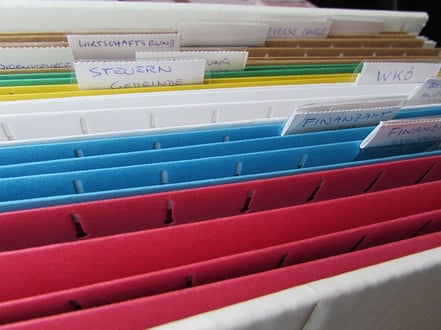Within the last couple of years, there have been some changes with regards to what needs to be included in your driver qualification files. Many people struggle with determining what truly needs to be in the files and what does not. They also get different opinions from different individuals (HR professionals, insurance reps, auditors, etc.)
One of the most common questions that we hear from clients is “how long do I need to keep various records?” Let’s discuss what needs to be kept, for how long, and who should have access.
Why Driver Files Can Be a Touchy (and Confusing) Subject
Records retention is a hot button for many in the transportation industry. We don’t want to hang onto data for too long and open the floodgates of what’s “discoverable,” and managing what is on file can pose a significant administrative burden.

The Basics of What’s Required
Let’s start with part 391.51 of the FMCSA Record Retention & Recordkeeping Requirements. Pursuant to this regulation, the following needs to be in a driver qualification file:
- Driver’s application
- Pre-employment questionnaire (if not included in the application)
- The initial MVR
- Certificate of road test (not required if the driver had to take a road test to obtain their CDL.)
- The MVR used for the annual review
- Certificate of violations
- Annual review
- If you have a driver with a medical exemption, then the skill performance evaluation certificate or the medical exemption document should be included
- Medical card
Required Documentation Related to the Medical Card
Let’s discuss the medical card in more detail. FMCSA does not require the long form of this - it requires the med card or a legible copy of the certificate. (The long form retention is a subject for another blog as there are many views towards pros and cons of keeping this information.)
There have been a couple of recent additions to the driver qualification file retention requirement related to the medical card. For each medical card issued after May 21, 2014, you are required to verify that the medical examiner is listed on the National Registry of Certified Medical Examiners and add a note to the file.
For every medical card issued after January 30, 2015, you need to have an MVR on file for that driver. Make sure the MVR (referred to as the CDLIS motor vehicle record in the regulations) includes the tier the driver is self-certifying for along with the examining physician’s information (including name and medical certification number).
We have had discussions with FMCSA officials with regards to state notification programs and exemptions. As of this date, we are being told that the CDLIS driving record needs to be ran.
Required Drug and Alcohol Information
While not required to be kept in the driver qualification file, there are two pieces of information related to Drug and Alcohol that we recommend keeping in the same file for ease of access during an audit:
- Pre-employment drug test results
- Receipt for your drug and alcohol policy
Although there are additional drug and alcohol records that have to be maintained, these are the ones that FMCSA will request during a compliance review.
How long should these records be kept?
Length of record retention requirements for some of the most common records vary. Please refer to
FMCSA’s regulations for the most detailed and up-to-date information, but some basic guidelines include:
- Driver Qualification files - for as long as the driver I employed and for 3 years thereafter
- Within the driver qualification files, the following items may be removed after 36 months:
- MVR associated with the annual review
- Certificate of violations
- Annual review
- Medical examiners certificate
- National registry note
- MVR associated with the medical card
- Accident register – 3 years
- Negative drug test results – 1 year
- Positive drug test results – 5 years
- Logs and supporting documents – 6 months
- DVIR’s with defects noted – 90 days
- Inspection, repair and maintenance records – one year and for 6 months after the motor vehicle leaves the motor carrier’s control
Keeping Driver Qualification Files Secure
It’s a best practice to keep your files in a secure area, but this merits extra attention if you are going to keep any drug and alcohol information in the driver qualification files. Is that’s the case, your records definitely need to be in a limited access / secure environment.
A file cabinet that locks (make sure the lock works and is locked when not in use) works well. If you are thinking about storing these files in your office, you may want to think about who else might have access (cleaning people, office staff, the boss, etc.) If multiple people can access, then this is not considered a secure environment.
You may also want to keep more information than what’s required. If this is the case, we recommend you maintain two sets of files: one file for FMCSA, and another file for everything else.
What questions do you have about records retention and maintaining driver qualification files? What hurdles have you run into in gathering the needed information? Have you had to pull this information during an FMCSA audit? Let us know in the comments!
Related Posts:
Avoiding a Big Rear End: Collisions Come with Hefty Cost
5 Reasons Why Truck Drivers Rock
Benefits for Truck Drivers: The Secret Weapon for Retention
When It Comes to Driver Hiring, Truckers Have a Story... Do You Know It?